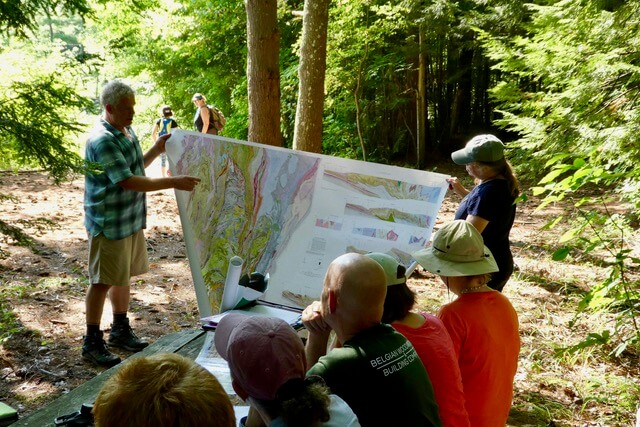[ad_1]
By Alexa Lewis, Vermont Master Naturalist, Program Coordinator
Attention, nature lovers and newcomers to the area!
Vermont has a unique history, and Charlotte’s local ecology and cultural geography are part of that story. We have an opportunity to explore the natural and cultural history of our town through the Vermont Master Naturalist Program. Alicia Daniel started the place-based VMN program five years ago and is considering offering it in Charlotte. Those of you who have had the chance to walk the woods with Alicia, or who are familiar with her work at UVM, know what a special person she is, and know too about her ability to find and enlist other talented naturalists to explore the outside spaces in our everyday lives.

Bristol Vermont Master Naturalist Program. Photo by Monica Erhart.
I’m working with Alicia in hopes of bringing her Vermont Master Naturalist program to Charlotte in the fall of 2022. The course would focus on our town and enhance our understanding of the special places we are lucky to enjoy, from the geology of Mt. Philo and the waterways (Lewis Creek, Lake Champlain, our wetlands) to the wildlife and cultural history that make Charlotte special. For this to happen, we need to demonstrate interest from those who would like to participate, as well as from those who would like to sponsor projects or contribute expertise.
The Vermont Master Naturalist program takes participants out into the field on five weekend days from September to May. Participants start by learning the local geology and soils and how the landscape evolved over time. This place-based approach lays the foundation for understanding why certain plants and trees form natural communities in our parks, forests and wetlands. Vermont Master Naturalist helps participants understand the links between habitat and inhabitants—the wildlife, birds and other animals found in Charlotte. For instance, experts like cultural geographer Jane Dorney and wildlife tracker Sophie Mazowita will share tips for identifying animal tracks and wildlife corridors and clues from the early days of European settlement.
Equipped with this new understanding, participants will engage in local projects to advance the town’s conservation efforts. VMN naturalists often become an important resource for longer term volunteer networks, joining conservation commissions, leading public walks, and planting trees far into the future.
In addition to finding participants and local funding sources, VMN is looking for project ideas from the community. If you are part of the Conservation Commission, Trails Committee or Land Trust, do you need help with a management plan, or the creation of a new brochure, or a demonstration pollinator garden site? Or do you know an educator or a nonprofit organization or town official with a project that needs the support of naturalist-trained volunteers? In other towns, VMN volunteers have helped develop management plans for town woodlands and wetlands, guided public walks, and increased tree canopy through community tree plantings. VMN wants to hear from you.
Please send your thoughts and requests to Alexa Lewis or Alicia Daniel.
To learn more about the program or to review ideas from past projects, look at the Vermont Master Naturalist website.
[ad_2]
Source link


